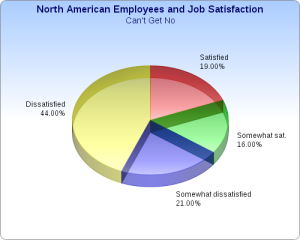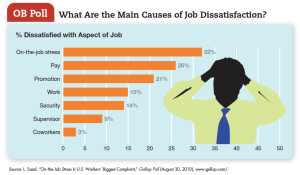For most people, is it the monetary compensation or the work itself more important?
Job satisfaction attempts to measure how employees feel about the organization’s expectations, rewards practices, values and the like. Job satisfaction refers to how well a job provides fulfillment of a need or want to employees as a source of enjoyment. Normally, job satisfaction is evaluative. There have been studies that prove that monetary compensation, initially, gives some type of satisfaction, but once an individual reaches a certain quality of life, money is not enough to create satisfaction.
Psychological Factors
One meta-analysis found that across dozens of different samples, psychological climate was strongly related to individuals’ level of job satisfaction (i).
A person with a high level of job satisfaction also has high job involvement and holds positive feelings about his or her job. Interestingly, jobs that provide training, variety, independence, and control satisfy most employees. Additionally, the social context of their workplace seems to be another factor for employee satisfaction, how well they get along and like their co-workers. Some other causes of job satisfaction have been found to include the following:
- Autonomy in job involvement: people identify psychologically with their job and consider their perceived performance level important to self-worth. In other words, these types of employees really care about the work they do and how the work influences their work environment—autonomy is important to them, as well.
- Personality also plays a role. Research has shown that people who have positive core self-evaluations —who believe in their inner worth and basic competence—are more satisfied with their jobs than those with negative core self-evaluations (ii). (Stephen p. 82)
![]()
Implication for managers
“the lack of dissatisfaction does not automatically generate satisfaction.”
It is of key importance to understanding and knowing what satisfies and dissatisfies employees, and how the lack of dissatisfaction does not automatically generate satisfaction, managers should create opportunities within the workplace for co-workers not to feel bored with their jobs, or feel under-empowered, and or, unappreciated. The manager can use job rotation, job variety, job enrichment and other incentives to keep employees motivated.
A Forbes article advises that organizations should have the following:
- Consistent values: An organization’s leadership demonstrating strength in good times and bad times by holding tightly to its core values.
- Long-Term focus: Employees don’t mind hard times so long they see their organization as having a bright future ahead.
- Local leadership: What happens within groups at the workplace matters a lot and managers should challenge themselves to find opportunities to improve the group culture and groupthink (read my Groupthink article).
- Continues communication: Organizations should share information when it is good and also when it is bad. It is not to say that they should be negative and say, “THIS IS BAD” but provide important information about the current reality of the organization is a must.
- Job development: provide employees with opportunities to gain new skills and paid training (I had that offered to me at one of my jobs), a paid trip to an EXPO, or simply a camp day to create better relationships with your co-workers (iii).
![]()
In conclusion, lack of job dissatisfaction does not automatically create job satisfaction, so as managers, we need to learn the causes of both, and then put in place a system that can balance a healthy work environment.
GIFT: Download Free eBook



